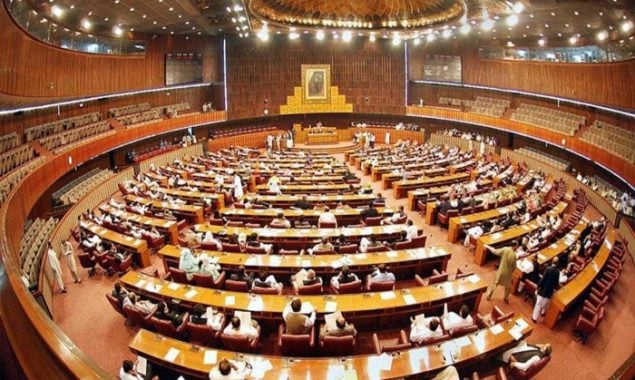
The National Assembly of Pakistan Photo: APP
Islamabad: The ratio of food inflation has increased multiple folds in Pakistan since the current government came in power in 2018.
The ratio of food inflation which was 3.1 per cent in 2018 for urban areas has risen to 9.4 per cent till October 2021 which is three times higher than the ratio which was recorded in May 2018.
Likewise, food inflation has also risen significantly in rural areas as well. It was recorded at 7.2 per cent in October 2021 and it was only 1.7 per cent three years back.
This was revealed in response to a question of a parliamentarian in the National Assembly.
PML-N MNA Maryam Aurangzaib had inquired from the Finance Ministry to state what was the ratio of food inflation in the country in 2018 and currently.
Replying to this question the relevant ministry provided figures which have been recorded by the Pakistan Bureau of Statistics (PBS) during the stated period.
However, the government cited the pandemic as a reason for inflation in food prices as the government struggled to keep the supply of commodities.
It maintained that Pakistan has also been affected as a net importer of food items especially wheat, sugar, pulses and edible oil. According to the government, food inflation is not a domestic phenomenon.
The ministry while quoting international prices of sugar, palm oil, soya bean, wheat and crude oil stated that sugar price witnessed 55 per cent upward change in three years while palm oil prices recorded 116 per cent increase in the international market during the same period.
According to statistics, soya bean prices swelled to 106 per cent, wheat prices recorded a 25 per cent upward change while crude oil witnessed 16.9 per cent increase internationally from October 2018 to October 2021.
The government maintained that the exchange rate in May 2018 was Rs115.4 while at present it is being recorded at Rs168.1 which means that import has also become more expensive which has impacted domestic inflation.
The government claimed that it is also building strategic reserves of wheat, sugar, pulses and edible oil to ensure price stability in the country.
In the same reply, it also maintained that it is importing 2.0 million metric tons (MMT) of wheat and 0.3 MMT of sugar to ensure a smooth supply of the commodities at reasonable prices.
Moreover, the government has decided to set the price of sugar at Rs90/kg (retail) across the country besides taking measures to release wheat at the price of 40kg to ease out its price and ensure smooth supply in the market.
The National Assembly today passed a motion allowing the use of the chamber of the lower house for the extraordinary session of the OIC Council of Foreign Ministers. The motion was moved by PTI’s MNA Aamir Dogar.
The session was prorogued for an indefinite period by Deputy Speaker Qasim Khan Suri right after passing of the motion by the House.
Catch all the Pakistan News, Breaking News Event and Latest News Updates on The BOL News
Download The BOL News App to get the Daily News Update & Follow us on Google News.




